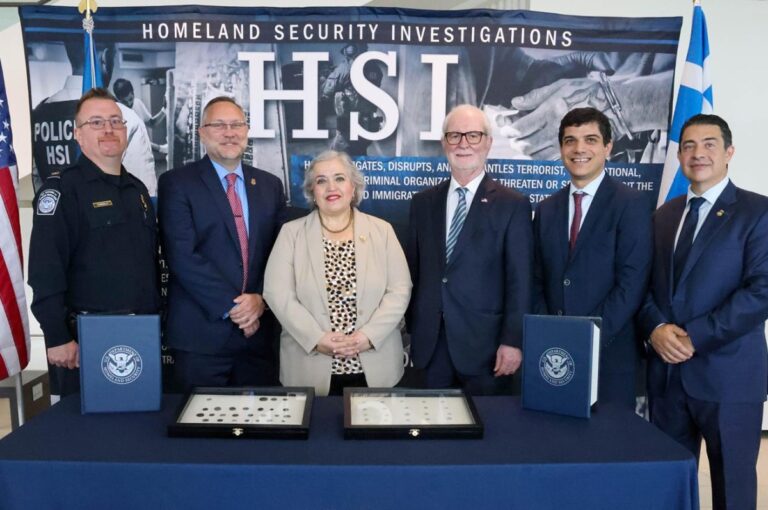Federal agents from Homeland Security Investigations, representatives of Greece and the Hellenic National Museum are conducting the largest repatriation of ancient coins to Greece. Photo courtesy of U.S. Immigration and Customs Enforcement
The ancient Greek coins were seized by U.S. Customs and Border Protection in four separate shipments as they entered the United States, after the senders and recipients were unable to provide the appropriate documents attesting to their ownership. Photo courtesy of U.S. Immigration and Customs Enforcement
Homeland Security Investigations returned the 51 seized Greek coins to representatives of Greece and the National Hellenic Museum during a repatriation ceremony in Chicago. Photo courtesy of U.S. Immigration and Customs Enforcement
June 21 (UPI) — The United States has returned dozens of stolen ancient coins to Greece, making it the largest collection of its kind to be intercepted by U.S. Customs and Border Protection and repatriated.
Homeland Security Investigations returned the 51 Greek coins to representatives of Greece and the National Hellenic Museum during a repatriation ceremony in Chicago, according to U.S. Immigration and Customs Enforcement. announcement Wednesday.
Advertisement
Greek Ambassador to the United States Alexandra Papadopoulou, Consul General Emmanuel Koubarakis and Consul Georgia Tasiopoulou were among the guests who received the repatriated coins at last week’s event.
“This is a successful example of how, when we join forces, we can make miracles happen,” Papadopoulou said.
“As these pieces return to Greece, where they belong, I am confident that they will be an exciting and powerful exhibition as part of our culture, our shared identity and our close relationship with the United States .”
The ancient Greek coins were seized by CBP in four separate shipments as they entered the United States, after the senders and recipients were unable to provide proper documentation verifying their ownership.
“Antiquities trafficking is a multi-billion dollar criminal enterprise, but when traffickers steal these antiquities from a country, they deprive a nation’s cultural heritage – purely for their potential to generate profits,” said HSI Chicago Special Agent. accuse R. Sean Fitzgerald.
“It is often extremely difficult to assign a specific monetary value to an ancient historical piece,” Fitzgerald added. “Despite this, as testimonies to the world’s oldest democracy, Greek cultural assets — according to HSI — are considered invaluable.”
Since 2007, HSI’s investigations have repatriated more than 20,000 objects, including paintings, statues, coins and manuscripts, to more than 40 countries as part of its Cultural Properties, Art and Antiquities program.
The CPAA program aims to improve international relations by returning “looted cultural heritage and stolen works of art”.
In financial year 2022The CPAA has repatriated religious objects and architectural designs stolen from Jewish communities during the Holocaust to 15 countries, including France, India, Iraq, Italy and Mali.


